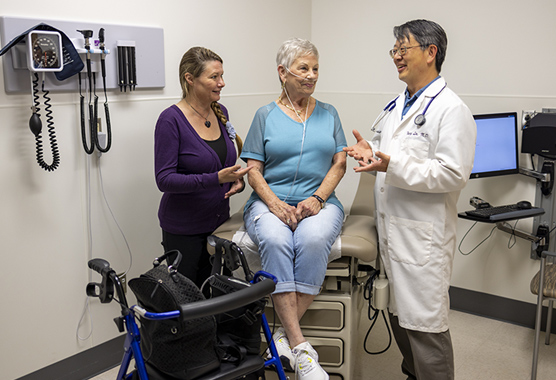Hashimoto’s Disease
Thyroid disorders are common and can have a major impact on your quality of life. We’re here to help you feel your best.
Medically reviewed by Aili Guo, M.D. on Nov. 28, 2023.

Hashimoto's Disease Care in Northern California
At UC Davis Health, our endocrinologists provide expert care and the most advanced treatments for thyroid disorders. We specialize in complex cases that involve multiple autoimmune diseases.
What Is Hashimoto’s Disease (Hashimoto’s Thyroiditis)?
Hashimoto’s disease, also called Hashimoto’s thyroiditis, is an autoimmune condition. It affects your thyroid, a small gland at the front of your neck below your voice box.
With this condition, your immune system damages your thyroid tissues, causing inflammation. This leads to hypothyroidism, or underactive thyroid, where the gland does not make enough thyroid hormone. Some people with Hashimoto’s disease develop an enlarged thyroid (goiter).
Your thyroid affects many of your body functions, so this condition can impact how you feel and your quality of life.
Hypothyroid Symptoms in Patient with Hashimoto’s Disease
Your symptoms may be mild or severe, and you may have a few or many symptoms. Some people have no symptoms.
Common Symptoms
You may experience:
- Concentration or memory problems
- Constipation
- Depression
- Dry hair and skin or hair loss
- Fatigue
- Fertility problems or low sex drive
- Goiter (enlarged thyroid)
- Slow heart rate
- Weight gain
Emergency Symptoms
If your thyroid hormone level becomes very low, you are at risk for a myxedema crisis, which is a medical emergency. Call 911 or get medical care right away if you experience:
- Fainting
- Low body temperature
- Slow breathing
- Very low blood pressure
- Very low blood sugar
Causes and Risk Factors of Hashimoto’s Disease
Hashimoto’s disease happens when your immune system makes antibodies that destroy thyroid tissue. Hashimoto’s disease is an autoimmune disorder, and the cause is usually unknown.
Certain things may trigger immune system changes that lead to Hashimoto’s disease. Possible triggers include radiation exposure, stress and viral infections.
There are factors that increase your risk of developing Hashimoto’s disease. These include:
Age
Your risk of developing Hashimoto’s disease increases as you get older. It is most common in middle age.
Family History
If you have close family members with Hashimoto’s disease or other autoimmune diseases, your risk for Hashimoto’s disease is higher.
Biological Sex
Hashimoto’s disease is more common in women.
Other Autoimmune Conditions
If you have other autoimmune diseases, your risk for Hashimoto’s disease is higher.
Diagnosis and Testing for Hashimoto’s Disease
Your provider will ask about your health history and symptoms and feel your throat to see if your thyroid is enlarged. You may need tests such as:
- Blood tests to check your thyroid hormone levels and look for elevated thyroid antibodies.
- Thyroid ultrasound to look for signs of inflammation in your thyroid, check its size, and look for thyroid nodules (growths).
Treatment for Hashimoto’s Disease at UC Davis Health
Our endocrinologists specialize in treating people with multiple autoimmune conditions. We work closely with your other providers to understand all of your health needs and personalize your treatment.
Your treatment depends on how severe your condition is. If you have Hashimoto’s but you have not developed clinical hypothyroidism, you may not need treatment.
Medication
The main treatment for Hashimoto’s disease is a synthetic (man-made) form of T4 thyroid hormone. The generic name of this drug is levothyroxine. You will need to take this medication every day for the rest of your life, but you may need adjustments to your dose over time.
Hashimoto’s disease affects
1-2%Of people in the U.S.
Source: NIH National Library of Medicine: MedlinePlus: Hashimoto’s disease
Request an Appointment
As Sacramento's No. 1 hospital, you'll benefit from unique advantages in primary care and specialty care. This includes prevention, diagnosis and treatment options from experts in 150 specialties.
Referring Physicians
To refer a patient, submit an electronic referral form or call.
800-4-UCDAVIS
Patients
Call to make an appointment.
Consumer Resource Center
800-2-UCDAVIS

Ranked among the nation’s best hospitals
A U.S. News & World Report best hospital in cardiology, heart & vascular surgery, diabetes & endocrinology, ENT, geriatrics, neurology & neurosurgery, and pulmonology & lung surgery.

Ranked among the nation’s best children’s hospitals
U.S. News & World Report ranked UC Davis Children’s Hospital among the best in pediatric nephrology, orthopedics*, and pulmonology & lung surgery. (*Together with Shriners Children’s Northern California)

Ranked Sacramento’s #1 hospital
Ranked Sacramento’s #1 hospital by U.S. News, and high-performing in aortic valve surgery, back surgery (spinal fusion), COPD, colon cancer surgery, diabetes, gynecological cancer surgery, heart arrhythmia, heart failure, kidney failure, leukemia, lymphoma & myeloma, lung cancer surgery, pacemaker implantation, pneumonia, prostate cancer surgery, stroke, TAVR, cancer, orthopedics, gastroenterology & GI surgery, and urology.

The nation’s highest nursing honor
UC Davis Medical Center has received Magnet® recognition, the nation’s highest honor for nursing excellence.

World-class cancer care
One of ~59 U.S. cancer centers designated “comprehensive” by the National Cancer Institute.

A leader in health care equality
For the 13th consecutive year, UC Davis Medical Center has been recognized as an LGBTQ+ Healthcare Equality Leader by the educational arm of America’s largest civil rights organization.

